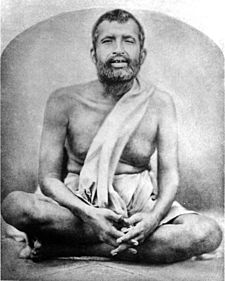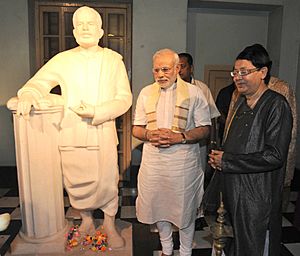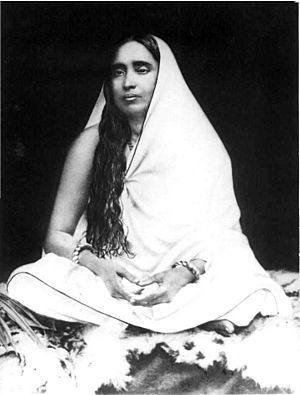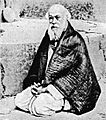Ramakrishna facts for kids
Quick facts for kids Ramakrishna Paramahansa |
|
|---|---|

Ramakrishna at Dakshineswar
|
|
| Birth Date | 18 February 1836 Kamarpukur, Bengal Presidency, Company Raj (present-day West Bengal, India) |
| Died on | 16 August 1886 (aged 50) Cossipore, Calcutta, Bengal Presidency, British India (present-day Kolkata, West Bengal, India) |
| Birth name | Gadadhar Chattopadhyaye |
| Guru/teacher | Totapuri, Bhairavi Brahmani |
| Philosophy | Advaita Vedanta Vaishnavism |
| Titles/honors | Paramahamsa |
Ramakrishna Paramahansa (born Gadadhar Chattopadhay) was an important Indian spiritual teacher. He lived from 1836 to 1886.
He explored many different religions. He taught that all religions are like different paths leading to the same goal. Many of his followers believed he was an avatar, which means a special form of God on Earth.
Contents
Early Life
Ramakrishna was born on February 18, 1836. His birthplace was the village of Kamarpukur in West Bengal, India. He came from a very poor but religious Bengali Brahmin family. He was the youngest of four children. His father was Khudiram Chattopadhyaya and his mother was Chandramani Devi.
It is said that his parents had special dreams and visions about his birth. For example, his father had a dream in which Lord Gadadhara (a form of Vishnu) told him he would be born as his son.
When Ramakrishna was about six or seven, he had his first spiritual experience. He was walking by a paddy field and eating puffed rice. He saw a group of white cranes flying against dark rain clouds. The sight was so beautiful that he became completely absorbed in it. He lost awareness of his surroundings and fell down. People nearby helped him get home.
At age nine, he received the sacred thread. This was a Brahmin tradition that allowed him to perform religious worship. He helped his family with their worship. Because of his strong devotion, he began to experience a deep spiritual state called Bhava-Samadhi. He had similar experiences a few other times when he was a child.
Education and Learning
Ramakrishna went to the village school where he learned to read and write. However, he did not like arithmetic and only learned basic math. He loved reading religious books like the Ramayana and the Mahabharata.
He noticed that many scholars were only interested in getting rich. This was very different from his father's way of living, which focused on being honest and not caring much about money. So, Ramakrishna lost interest in what he called "bread-winning education."
Instead, he became very good at making images, acting, and painting. When he was fourteen, he started a drama group with his friends and left school to focus on it. Ramakrishna had almost no formal schooling. He spoke Bengali with a simple, village accent.
Ramakrishna's father passed away in 1843 when Ramakrishna was about seven and a half years old. This was a very difficult loss for him.
Becoming a Priest
Ramakrishna began his spiritual journey as a priest at the Dakshineswar Kali Temple. This temple was built by Rani Rashmoni. Soon, Ramakrishna's deep spiritual nature became well-known. People saw him as a Guru, which is a spiritual teacher. Many religious teachers, leaders, and everyday people came to him.
At first, he didn't want to be called a guru. But he eventually taught many students. These students later formed the monastic Ramakrishna Order.
Marriage
In 1859, Ramakrishna married Saradamani Mukhopadhyaya. She later became known as Sarada Devi and is also seen as a special form of God by many. Ramakrishna had a big influence on Sarada's life, and she became a strong follower of his teachings. After their marriage, Sarada stayed in her village for some time. She joined Ramakrishna in Dakshineswar when she was eighteen.
Later Life and Passing
Ramakrishna passed away from throat cancer on the night of August 15, 1886. After he died, his main student, Swami Vivekananda, helped spread his ideas. Vivekananda founded the Ramakrishna Math, which trains monks and householders. He also started the Ramakrishna Mission, which does charity work, social work, and provides education.
Influence and Legacy

Ramakrishna is seen as a very important person in the Bengali Renaissance of the 19th and 20th centuries. Many organizations have been created in his name. The Ramakrishna Math and Ramakrishna Mission are the main organizations. Swami Vivekananda founded them in 1897.
The Mission does a lot of work in many areas. This includes health care, helping people after disasters, and improving education. This movement is considered one of the ways India was spiritually renewed. Swami Vivekananda's idea of "social service" came directly from Ramakrishna's teachings.
Other groups also exist, like the Vedanta Society and the Sri Sarada Math. These groups continue to spread Ramakrishna's message and teachings.
Images for kids
-
Ramakrishna in a deep spiritual state after singing about Kali.
-
Some of Ramakrishna's monastic students, including Swami Vivekananda.
See also
 In Spanish: Ramakrishna para niños
In Spanish: Ramakrishna para niños
 | Chris Smalls |
 | Fred Hampton |
 | Ralph Abernathy |










